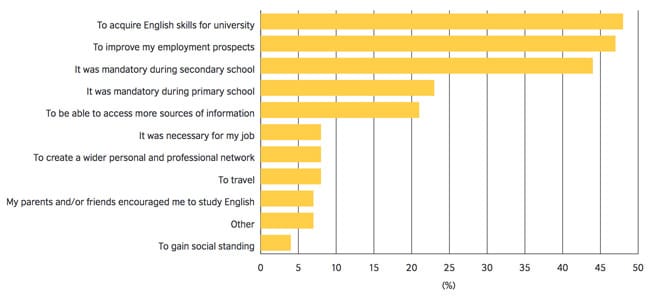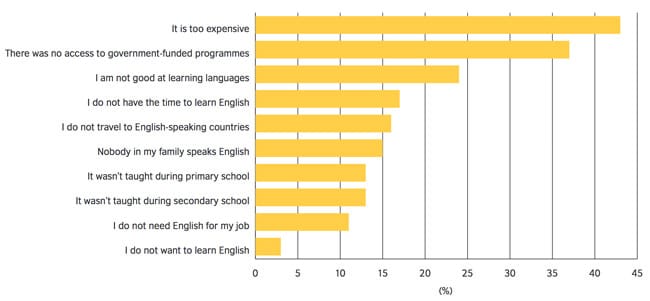New study offers important insights on demand for English training in Colombia
The British Council recently released a study entitled English in Colombia: An examination of policy, perceptions and influencing factors. It rounds out previous findings on this important Latin market and discusses Colombia’s challenges as it implements a set of goals scheduled for completion in 2019.
Bilingual by 2019
Colombia’s Foreign Languages Competencies Development Programme (PFDCLE), formerly named the National Bilingual Programme, was launched in 2004 with the goal of leveraging Colombia’s human capital via language learning. Official Colombian policy mandates English in all schools, and the plan through 2019 is to make the country bilingual by achieving targeted levels of English proficiency according to the Common European Framework of Reference for Languages (CEFR). More specifically, the Colombian plan targets B1 (intermediate) fluency for secondary school graduates, B2 (upper intermediate) for university graduates, and B2 or C1 (advanced) for teachers of English. The Ministry of Education actively supports these goals with various programmes. For example, a recent government initiative saw 124 foreign English teachers arrive in Colombia to help public schools improve the English proficiency of students. The project was launched in cooperation with the volunteer organisation Heart for Change and is designed to benefit as many as 30,000 secondary pupils. However, the government is limited in what it can do as Colombia is a highly decentralised state. There is no national curriculum and substantial control over its schools rests with its 32 local governments, plus the capital district of Bogota, and their 94 education secretariats. While PFDCLE’s priorities have evolved over the years, its four main areas of concern are currently:
- In-service teacher training and coaching;
- Pedagogical support;
- Evaluation and assessment;
- Institutional capacity building.
The government sets broad targets for local governments, but detailed implementation and decision-making often falls into the hands of schools and teachers. The British Council points out that this is problematic for several reasons, including the fact that "skills and motivations for English language teaching may not be high enough to deliver English lessons, let alone to develop pedagogies for foreign language teaching."
Teachers’ lack of resources and preparedness is one of the most serious issues with English language learning in Colombia.
However, government funding for the upcoming years is expected to increase, with the specific goal of addressing these challenges and others, including a lack of progress-measuring mechanisms and classes that are too large. While the government’s targets are clear, the British Council notes that the 2019 goals may be difficult to achieve. In 2012, 31.5% of university entrants were below A1 (beginner) on the CEFR, 35.8% were at an A1 level, and just 1% of secondary students could be considered truly bilingual. In a country with more than 60 indigenous languages, English is the second most prevalent but is spoken by only 4.1% of the population. The report adds, "The British Council estimates that 11.5 million people in Colombia - just over a quarter of the population - are studying English via public and private formal education from primary to tertiary level as well as through private English language training courses and self-access learning." English plays an important role in research, study abroad, student mobility, and academic partnerships at the university level in Colombia. However, as internationalisation is a relatively recent development at many institutions, most cannot ensure that students outside of teaching or language faculties have access to the language. Many of those students enrol in private language schools, either concurrent to their university studies or during a dedicated break, to improve their skills. The report estimates that roughly 581,000 people in Colombia are taking "or have the potential to take" private English classes.
The students’ view
The British Council surveyed students and former students and produced an informative snapshot of their motivations for studying English. When asked to select from a list the reason or reasons they had chosen to learn English, 48% of respondents indicated that the skill was needed for university. An almost equal percentage of respondents stated that they needed English for secondary school (44%).


What employers want
A further British Council survey explores the links between English ability and employment from the employers’ perspective.
More than two-thirds (68%) of responding employers said English was an essential skill sought in new hires, and 81% rated English as a seven or above on a one to ten scale in terms of importance.
Along the same line, 69% of managers called English a “must-have” skill in their current position, once again reinforcing the reality that employment opportunities in Colombia are markedly improved for those who speak English. Survey respondents generally characterised English as the universal language of business. Many employers noted that it not only allowed Colombian businesses to work with entities in the English-speaking world, but also to share a common language during interactions with entities in non-English-speaking countries such as China and Russia.
Creating the context for change
The British Council notes that while incentives for learning and teaching English are lacking in some quarters, and access to language training remains a concern, interest in learning English is high. But a broad wave of bilingualism cannot come from the grassroots due to the language not being established in family life or business cultures. Therefore, political and economic factors are important in determining the long-term success of the country in building language proficiency and reaching its ambitious goals in 2019 or after. One of those political factors had been the government’s relationship with teachers, 300,000 of whom went on strike in April over salaries, health care plans, and evaluation methods used to measure their work and determine whether they could be promoted. President Juan Manuel Santos agreed that teachers needed better pay, better training, and better working conditions, and in May his administration made concessions. Teachers also demanded more investment in public schools, and President Santos announced just last month that his administration plans to invest a further US$1.75 billion to build or upgrade as many as 30,000 classrooms or 1,500 schools over the next four years. The President has called the initiative "the most ambitious investment in the construction and improvement of schools in the history of Colombia." As the scale of this investment suggests, much remains to be done. But with the government vowing to make Colombia the region’s best-educated country by 2025, new investment in schools, and the PFDCLE framework for English language adoption in classrooms, the stage is set for a significant expansion of English learning and usage in education and beyond.
















